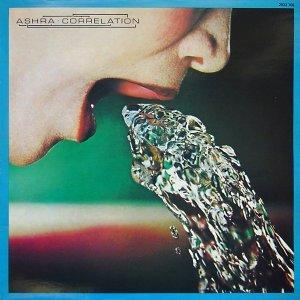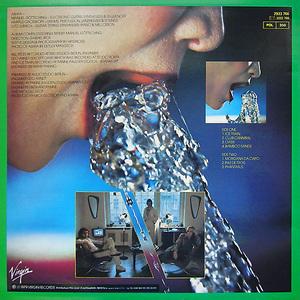Correlations
by Ashra


Artist:
Ashra
Label:
Virgin
Catalog#:
V 2117
Format:
Vinyl
Country:
United States
Released:
1979-03
| Tracklist | |||
| A1 | Ice Train | 7:40 | |
| A2 | Club Cannibal | 5:25 | |
| A3 | Oasis | 4:43 | |
| A4 | Bamboo Sands | 4:38 | |
| B1 | Morgana Da Capo | 5:24 | |
| B2 | Pas De Trois | 8:59 | |
| B3 | Phantasus | 5:07 | |
Credits
Drums, Percussion, Synthesizer, Performer [Sounds] - Harald Grosskopf
Guitar, Synthesizer [String], Piano, Mellotron - Lutz Ulbrich
Guitar, Synthesizer, Sequenced By [Sequencer], Compiled By - Manuel Göttsching
Producer - Ashra
Producer - Mick Glossop
Strawberry Bricks Entry:
With nearly a decade of work behind him, guitarist Manuel Göttsching was one of the pillars of the so-called Berlin School of electronic rock. In 1974, Göttsching recorded Inventions For Electric Guitar, his first true solo album (played only on guitar), at his new Studio Roma in Berlin. His guitar technique is similar to Achim Reichel or Robert Fripp: Using layers of echo-effect guitar, Göttsching created hypnotic washes of sound—early "trance" in modern terms. After a few years of collaborations (most notably with Michael Hoenig), he returned under the moniker Ashra, signed with Virgin Records and released the excellent New Age Of Earth in 1977. Göttsching favored keyboards this time around, but the results were lilke his previous work. He then assembled a band with guitarist Lüül Ulbrich from Agitation Free and drummer Harald Grosskopf from Wallenstein, and began to tour, including gigs in the UK and France. Blackouts followed shortly thereafter, with Göttsching again playing all of the instruments on the record. It was heavily-sequenced rock, and comparable to Steve Hillage's work of the same period. Released in 1979, Correlations offers the first listen to Ashra, the band. Needless to say, the compositions gain significant mass with the extra musicians on board. "Ice Train" is lively rock that features layers upon layers of guitar, while "Pas De Trois" emphasizes rhythm. Certainly, the album is a product of late 70s technology, but it also gives a nod to the emerging "new wave." In 1981, Göttsching recorded the landmark E2-E4 (released on Klaus Schulze's label in 1984), which presaged most 90s techno music.

